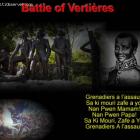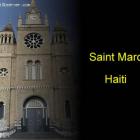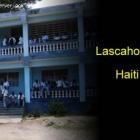ADVERTISEMENT
Previous Government
Franck Sylvain Brief Presidency
Franck Sylvain, Haiti's 37th president, began life in his birthplace of Grand-Goâve. He earned a law degree, practicing as an attorney after graduation. He later was appointed to the bench as a Civil-Law Court judge, rendering a decision in favor of one of President Paul Magloire's intimate friends. For that political favor he was retained by President Magloire for further government legal matters.
Sylvain began his political career when he established The Crusade, a pro-active publication that raised the consciousness of the Haitian people about Communism's imminent threat to Haiti's struggle for democracy. He also headed a political party, Rally for the Haitian People, an underground organization.
Daniel Fignole a Brilliant Labor Leader
Daniel Fignole, born in 1913 in Pestel and raised in grinding poverty, suffered from childhood malnutrition. To escape the poverty of his birthplace, Daniel re-settled in Port-au-Prince and sought an education. He proved to be an excellent student, winning acceptance to a top-tier university in the capital.
During the early 1940s, Daniel Fignole published the leftist, Chantiers, in which he harshly criticized the mulatto elite of Haiti. President Elié Lescot, provoked by Fignolé's attacks, stopped the publication, axed him from his government job, and spied on him.
Indifferent to government actions, Daniel Fignole kept organizing the working-class of Port-au-Prince. They became aware of him as an electrifying orator, motivational writer, and powerful labor leader. It was rumored he could rally mass demonstrations at a moment's notice. In 1947, he headed the Peasant Worker Movement, a tight-knit union comprised of every labor sector.
Stenio Vincent Uneasy Alliance with the Dominican Republic
Stenio Vincent was the 30th President of Haiti, from 1930-1941. Born of mixed-race parentage, he earned his law-school degree by his 18th birthday. He rose to prominence in the leadership role in the Chamber of Deputies before running for the presidency. As part of his political platform, he voiced extreme disapproval of the U.S. occupation of Haiti. Vincent won the National Assembly majority vote and assumed office in October 1930.
By 1934, after U.S. military forces pulled out, Stenio Vincent began oppressing opposition leaders, spying on and incarcerating them. Now a loyal supporter of U.S. democracy, he became signatory on a trade agreement with them. In 1935, he won the popular vote, keeping him in office until 1941.
Paul Magloire, Haiti's 35th president
Paul Magloire, Haiti's 35th president, was born in 1907, heir of a military father. He followed his father's career path, enlisting in the army and rising to Chief of Police in Port-au-Prince.
Paul Magloire played a pivotal role in overthrowing two Haitian presidents, Élie Lescot and his successor, Dumarsais Estimé. President Estimé, in a fruitless effort to draw out his time in office, attempted to amend the Constitution. The mulatto elite aided Magloire in deposing Estimé. Magloire then took the reins of power as President of Haiti.
During his term, Paul Magloire poured money into tourism, Haiti becoming known as a desirable vacation destination for foreign travelers. Imposing a tax on coffee-bean exports, he used the monies for development projects, raising living standards of the impoverished, as well as improving city services. Most notably, he gave the right-to-vote to women. In foreign policy, he forged stronger relations with the Dominican Republic, reversing the violent and unstable history they had shared in the past.
Dictator Jean-Claude Duvalier, Son of Dictator Francois Duvalier
Jean-Claude Duvalier was growing up in an insular and wealthy family culture. When Francois Duvalier died in 1971, Jean-Claude inherited the presidency while still in his teens. At this time he was considered the youngest person on the globe to hold the office.
Jean-Claude Duvalier was not interested in the duties of office, delegating authority in most government matters to his mother, Simone. He made only superficial changes to his father's administration, preferring instead to be a figurehead rather than a hands-on ruler.
Jean-Claude Duvalier engaged in corruption practices, using family riches from a tobacco inheritance to steal revenues from government programs. Other illegal activities used to increase his wealth included selling human remains to medical institutions outside the country and drug trafficking.
Marc Louis Bazin, Haiti's functionary in the United Nations
Marc Louis Bazin who was functionary of the United Nations and Minister of Finance and Economy in the Haitian government was born on March 6th, 1932. The military which had seized power made him the Prime Minister in June 1992.
Grew To Be a Favorite of US
Soon Marc Louis Bazin became the President of Haiti and continued in the post for a year. He was the favorite Haitian presidential candidate for the Bush administration in US. The military dictatorship was harming foreign relations and the government had gone in for free elections.
Ertha Pascal-Trouillot - The Haitian woman president
The year 1990 -1991 saw a woman adorning the seat of the president of Haiti and this was the first time it was happening in the history of Haiti. Ertha Pascal Trouillot was the ninth child of a family of ten children. At the age of 10 she was sent to be mentored under Ernst Trouillot, along with one of her brothers.
Judge for Many Years
Though she wished to pursue a career in science she was directed by her mentor to law and later into politics. He wanted to be with and this later led to the marriage of the two, even though he was 21 years her senior.
Chief Justice of the Supreme Court in Haiti Emile Jonassaint
Emile Jonassaint was born on May 20th 1913 and became the Chief Justice of the Supreme Court in Haiti and later served as the president for a short period. Earlier the military regime had forced Jean Bernard Aristide to move out of the country.
Crimes by the Army
After a few years from May 12th to October 12th 1994, Emile Jonassaint functioned as the Head of the Provisional Government. During his tenure it is alleged that some of the most inhuman crimes were meted out by the Haitian army.
Raoul Cedras - the effective de facto leader of Haiti
Raoul Cedras was the de facto leader of Haiti for three years, from 1991 to 1994. He was born on July 9th, 1949 and got into the military in the US early in life. He was educated in the US and later joined the Leopard Corps which was trained by the US forces. Yanick Prosper was the spouse of Cedras.
Important CIA Agent
As the Lieutenant General of the Haitian army Raoul Cedras was chiefly responsible for ousting the president Jean Bertrand Aristide. He was a crucial CIA agent who reported on the president. He went on to become the Commander-in-Chief of the army.
President of Haiti - Henri Namphy
Born on November 2nd 1932 at Cap- Haitien, Henri Namphy was another military leader who became the president of Haiti. In the army he rose to the post of a general. His first stint in the political area was as the President of Haiti during a period where the interim body ruled.
Interim Council
The interim body was the National Council of Government and they ruled from February 1986 to February 1988. This interim council consisted of six civilians and six military personnel. This interim body assured elections and reforms that would be people friendly.
Our objective is to share with you news and information about Haiti and the people of Haiti. Traditions, habits and the way we were or grew are alive in this site. We highly recommend that you Subscribe to our Newsletter and also share with us some of the things that are memorable and made us unique people.

 Battle of Vertieres
Battle of Vertieres  Something to think about
Something to think about  Newsletter
Newsletter  Saint Marc, Haiti
Saint Marc, Haiti  Lascahobas, Haiti
Lascahobas, Haiti